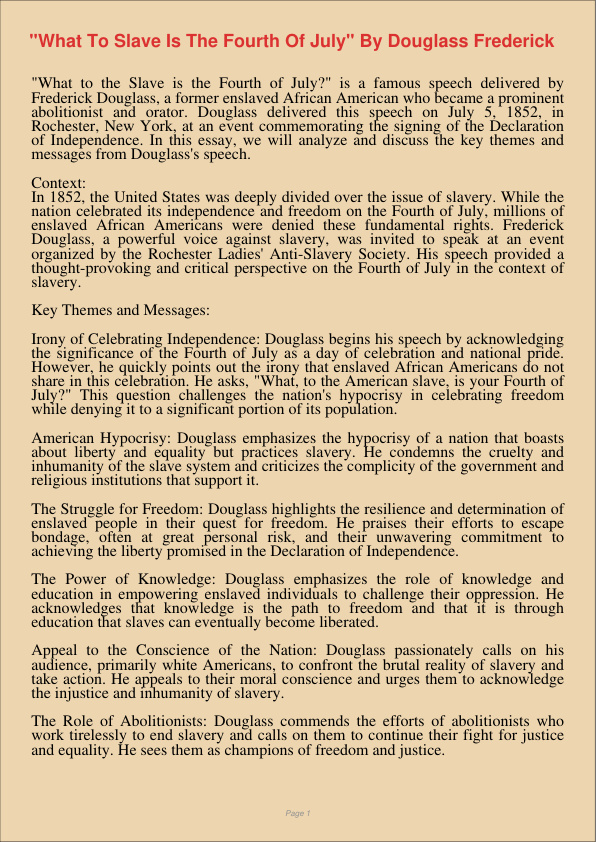What To Slave Is The Fourth Of July By Douglass Frederick
Jan 12, 2024
douglass frederick
slave
Health Sciences & Medicine
Law

“What to the Slave is the Fourth of July?” is a famous speech delivered by Frederick Douglass, a former enslaved African American who became a prominent abolitionist and orator. Douglass delivered this speech on July 5, 1852, in Rochester, New York, at an event commemorating the signing of the Declaration of Independence. In this essay, we will analyze and discuss the key themes and messages from Douglass’s speech.
Context: In 1852, the United States was deeply divided over the issue of slavery. While the nation celebrated its independence and freedom on the Fourth of July, millions of enslaved African Americans were denied these fundamental rights. Frederick Douglass, a powerful voice against slavery, was invited to speak at an event organized by the Rochester Ladies’ Anti-Slavery Society. His speech provided a thought-provoking and critical perspective on the Fourth of July in the context of slavery.
Key Themes and Messages:
Irony of Celebrating Independence: Douglass begins his speech by acknowledging the significance of the Fourth of July as a day of celebration and national pride. However, he quickly points out the irony that enslaved African Americans do not share in this celebration. He asks, “What, to the American slave, is your Fourth of July?” This question challenges the nation’s hypocrisy in celebrating freedom while denying it to a significant portion of its population.
American Hypocrisy: Douglass emphasizes the hypocrisy of a nation that boasts about liberty and equality but practices slavery. He condemns the cruelty and inhumanity of the slave system and criticizes the complicity of the government and religious institutions that support it.
The Struggle for Freedom: Douglass highlights the resilience and determination of enslaved people in their quest for freedom. He praises their efforts to escape bondage, often at great personal risk, and their unwavering commitment to achieving the liberty promised in the Declaration of Independence.
The Power of Knowledge: Douglass emphasizes the role of knowledge and education in empowering enslaved individuals to challenge their oppression. He acknowledges that knowledge is the path to freedom and that it is through education that slaves can eventually become liberated.
Appeal to the Conscience of the Nation: Douglass passionately calls on his audience, primarily white Americans, to confront the brutal reality of slavery and take action. He appeals to their moral conscience and urges them to acknowledge the injustice and inhumanity of slavery.
The Role of Abolitionists: Douglass commends the efforts of abolitionists who work tirelessly to end slavery and calls on them to continue their fight for justice and equality. He sees them as champions of freedom and justice.
Hope for the Future: Despite the grim circumstances, Douglass expresses hope that one day, America will live up to its ideals and grant freedom and equal rights to all its citizens. He believes in the power of moral persuasion and activism to bring about change.
In “What to the Slave is the Fourth of July?” Frederick Douglass masterfully challenges the hypocrisy of celebrating freedom in a nation that permits and sustains slavery. He uses the occasion to deliver a passionate critique of the institution of slavery and an appeal for justice and equality. His speech remains a powerful and enduring call for social and political change and a reminder of the ongoing struggle for civil rights and equality in the United States.